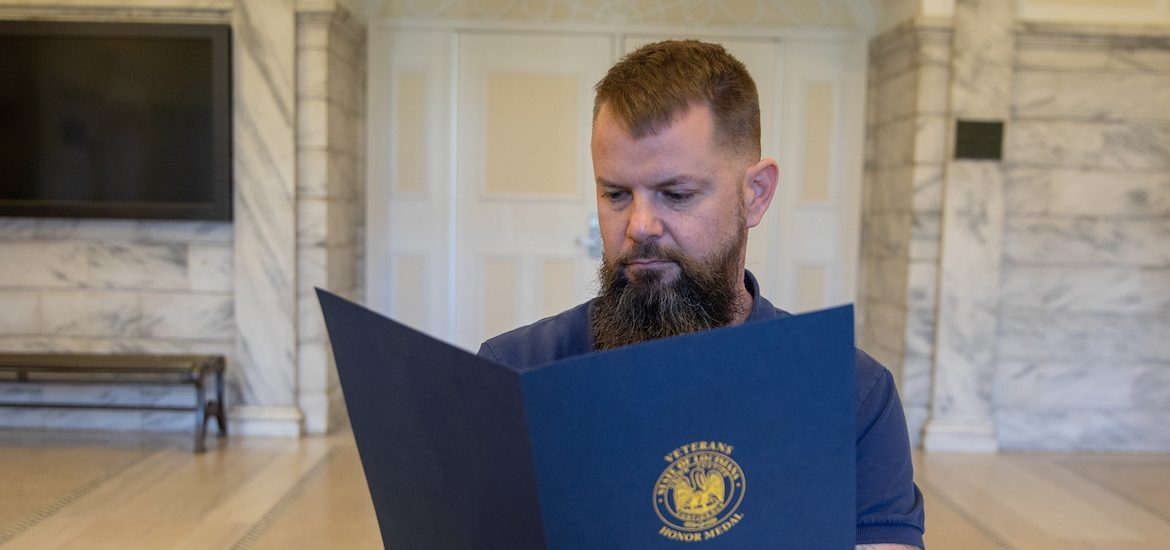After multiple tours to Iraq, one to the western Pacific and more than 20 years in service to his country, Staff Sergeant Morgan Kelley had planned to enjoy some quiet time and look for government employment after he retired from the United States Marine Corps. But when his family moved close to the Rowan University campus, Morgan thought back to his time in the Corps, where he says, “We challenge ourselves every day.” He gave college, and Rowan’s Disaster Preparedness and Emergency Management (DPEM) program, a chance, and he hasn’t looked back since. We recognize veterans this week by sharing Morgan’s story.
Can you talk a little bit about why you joined the Marines? What was your motivation to join?
It was around eighth grade, so I was maybe 13. And it was just something I had seen, the Marines. It was just something that drew me in there. And then from there, that was all I could think about all the way through high school. And once I turned 16, I actually went to the recruiting station to talk to them, and they’re like, “Yeah, we can’t talk to you. You’re not old enough.” But then, on my 17th birthday, the recruiter showed up at my house to talk to me about my options and join. And it was just a no-brainer for me. That’s what I had to do.
Was there any other plan if it wasn’t military that you were going to do?
No, no, I was set on it. And that’s what was happening. I was in high school ROTC, Air Force ROTC, it didn’t even matter, anything that I could do that felt military like or could give me some kind of foundation to be where I wanted to be, but it was going to be in the Marine Corps, period. And then I don’t know what would have happened if I didn’t. I never had a second plan.
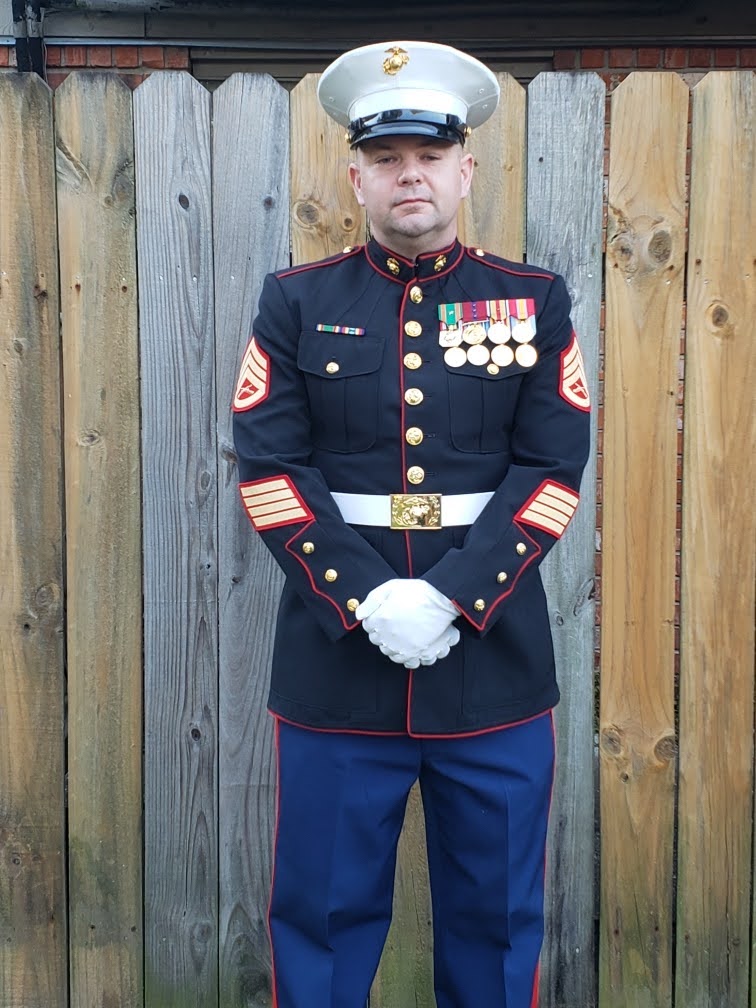
Can you talk a little bit about which war you served in and where you served the majority of your time.
I started off as a reservist and was an ammunitions technician. I didn’t really like that too much once I figured out what it was. So I did a lateral move into the air wing. And my first deployment was around 2005. We got the call, and we were going to Iraq. And we left that March of 2005. And then we spent the rest of that year there. I was stationed in Atlanta at the time, Dobbins Air Force Base, VMFA-142. We came back, worked another year or two there.
I ended up getting orders to Fort Worth, Texas, where I was at VMFA-112. And shortly after I got there in 2009, we deployed again to Iraq in support of the Iraqi Freedom Operation, Iraqi Freedom and Enduring Freedom. Once we were done there we come home a couple of years later, since 2009, 2012 deployed again on a western Pacific tour. That was about eight, nine months and then [we] came back and moved to New Orleans, where I was stationed with a helicopter squadron of all things. It was definitely new to me because I’m a fixed wing mechanic, and something that doesn’t have wings is just not natural to me.
Can you elaborate a little more about the job?
I had no idea when I laterally moved, I’d never seen an airplane in my life. I’d never been on a plane, definitely never been to an airport, it just wasn’t something I’ve ever messed with or even thought about. My first introduction was — they were called transitional recruiters, but it was like, “Hey, I got a great deal for you. Get your station on an Air Force base. You’re gonna have all the nice chow halls and you’re gonna be working on F/A 18s,” ok. But at the time it was, “You’re going to be an AC mechanic.”
Now, you know, to most people [that’s] air conditioning, right? And I thought, Well, that sounds alright. HVAC skills. I could use that. Yeah, no. I got orders and showed up at this place and immediately wasn’t scared, just had zero idea what was going on. I walk in, there’s this huge aircraft. And they’re like, “Oh, yeah, well, you know, you’re going to be working on this, you’ll be an engine mechanic, fuel system, you’re going to learn everything.” I don’t know if I want to do that. Turn around: I loved it. I loved every day of it.
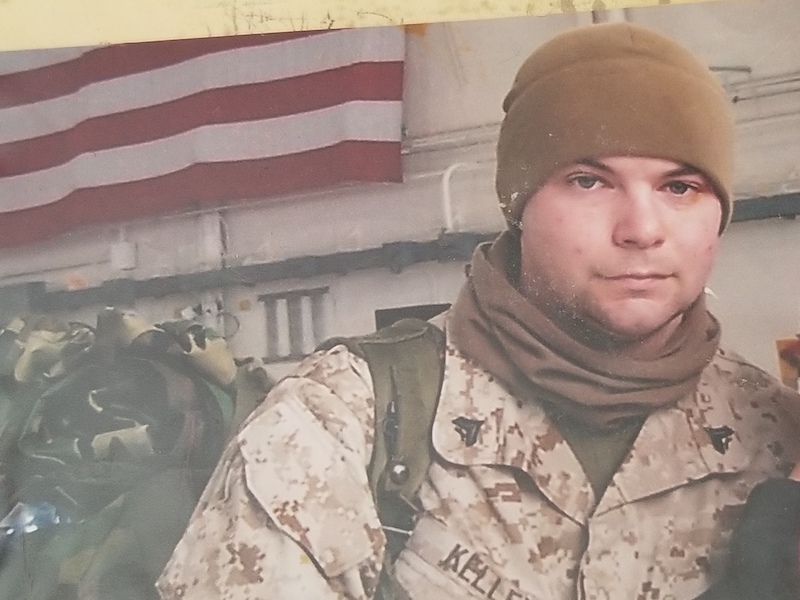
Were you awarded any medals or citations? And if so, which are you most honored to have received and why?
You know, I guess we always strive as Marines to get these awards and these accolades. And I did get a few. The highest I got was a Navy Commendation Medal. And that was just kind of an end to tour award, a culmination of all the years that I worked and the Marines that I helped.
But the one that stood out the most to me — I received a Navy and Marine Corps Achievement Medal for life saving. One of my neighbors, somebody came and knocked on my door in my apartment in Louisiana, and they’re like, “Are you a Marine?” Well, Mr. Dennis, my neighbor, longtime friend, older gentleman, Dennis fell, and we [neighbors couldn’t get him back] up. We couldn’t figure out what’s wrong, so I ran over. And he was unresponsive. So you know, I just did what I was trained to do. I secured the area, helped the man, got people to call 911 and got the first responders in there, gave them the situation at hand. It felt like a normal thing to go and help.
My commanding officer (CO) found out through other channels. And it was weird, because the day that the CO comes down to talk to me about it, you usually don’t want the CO to come out like, “You and me need to talk,” right? I say “Oh, ok, sir. What’s the problem?” He’s like, “Oh, there’s no problem.” And then he just called formation and pulled me out to give me this award. That was the one, I want to say the most, you know, I mean, obviously, [other medals] were definitely very meaningful; anytime you can come back from a deployment intact or in general is always an achievement, I think.
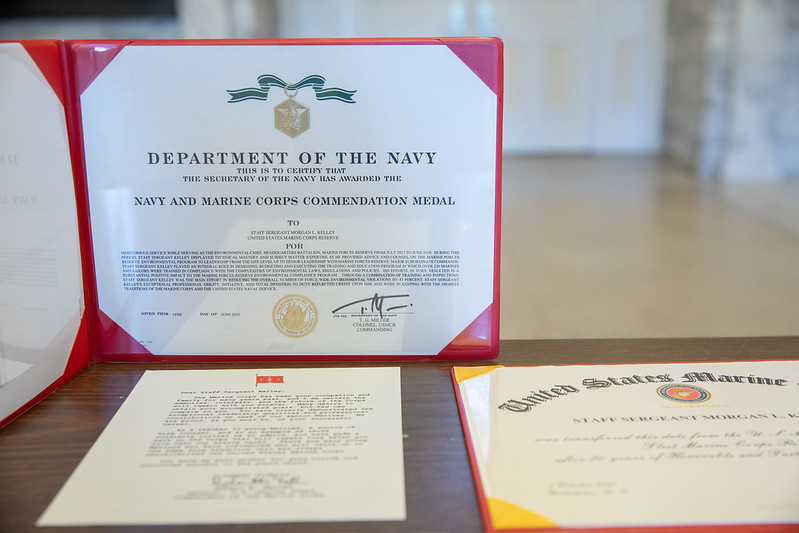
After retirement, was there anything or anyone that helped you during your transition from military to civilian life?
My last duty station, I was lucky enough to work at headquarters Marine Corps for Marine Forces Reserve. And we were a melting pot of people. Some of us were in uniform, some were civilian, some were prior service, and some had never served. And I believe that getting to work alongside all these different entities, that definitely helped a little with the transition, though it was still very structured and military.
Do you have any advice for those who are transitioning from military to civilian life?
You know, you’ve got to take it all in stride and a day at a time because it really is different. You live a structured life, even if you feel like you’re not, every single day, as a Marine, 24/7. It’s just … whenever you do the transition, it feels good. But then it’s also scary. Because now anything you’ve ever known is kind of gone. You’re no longer in charge of people or places and things that you do. So you have to make that adjustment.
So you retire. What is the thought process for your life after you retire? What do you start going through your mind as “Ok, this is my next step in life?”
Yeah, that’s a great question. Because whenever you finally … I’ll never believe the guys before me that were retiring. All my buddies are like, “Yeah, man, one day you just wake up. And you’re like, yeah, I’m done.” And you submit your paperwork. I couldn’t see how that’s possible. And then sure enough, it is just one day you’re like, “Ok, it’s time to time to make that move.”
I’ve worked my entire life since I can remember, 7 years old. I immediately assumed I was going to keep working, you know. I was applying for government jobs and that process takes months and so I just planned to sit back and wait and kind of enjoy my time off. Enjoy the family. And then now the wife and I made that command decision to move here.
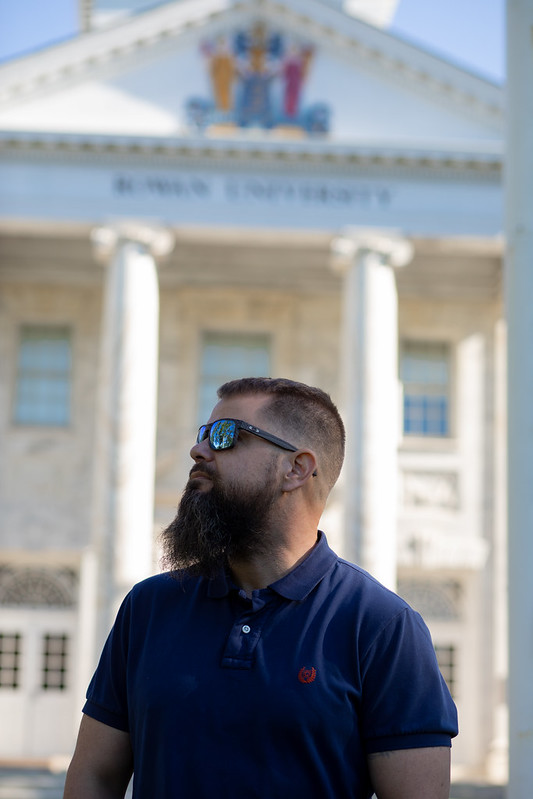
What was the process? Like about going back to college? Like, when did you decide, “This is what I wanted to do?”
I never thought about going to school, just because it didn’t interest me, you know. So once we moved here, and we got settled in, I go to the military service officer at the school. I just want to see what they have. We went over a few things, and now I talk to the wife and say, “Hey, I want to do it.” I don’t know how long it is, what, 12, 15 weeks? It doesn’t matter. Why, it can’t be any harder than anything I’ve ever done. So my worst case scenario, I go for a semester, and I don’t like it. And I don’t go back. Yeah, no harm, no foul.
I got in, and I think I was only four weeks in before I realized exactly what path I wanted to go down and what degree work I wanted to do. And, I’ve enjoyed all of the experience. First family member from my immediate family … but you know, the college experience has been completely different for me. I don’t get the dorm room and all that stuff. [But] it’s been great. Definitely different.
Can you talk a little bit more about the process of whenever you said you went over to Rowan and you talk to them? What was that process like?
It wasn’t complicated once I found the person I needed to talk to. And we went in and I wanted to talk to him about all my options. I needed to know how the 9/11 GI Bill works or how the VA education works, which one is more beneficial for me. And you know all the ins and outs because even while we’re serving, we’re only taught we have this, you know, but nobody tells you how to use it. Because also while you’re active duty you have another thing you never have to use that you have tuition assistance. So they were very helpful. And every way and every single process that I needed, they would answer the questions that I had; nothing seemed trivial. And I have a lot of questions.
So you said after four weeks, it hit you. You knew exactly what you wanted to do. Can you tell me what that is? What you’re studying now and what your plans are with what you’re studying and how to use it in the future?
My first DPEM class was Intro to Homeland Security. And as soon as I got in there, and as soon as we started going over the basic stuff, I was like, “Oh, yeah, no, this is it. This is what I need to be doing.” It’s not a hard transition from what I was doing.
Now I’m in my senior year, and I couldn’t imagine anything else now once I graduate. I’ve always been interested in FEMA, health and safety. So I don’t know exactly which way I’m going to go whenever I get done. Like if I want to go work for FEMA itself, or try even Homeland Security. I do believe I will go government just because I feel more comfortable there. Being an emergency manager for any, any place would be awesome.
I do tell some of the students that are in my class, the younger [students], you don’t have to try to start off big once you graduate, you know, you don’t have to try to be the director of FEMA, you know, sometimes local is better. If I can help the community by working in an emergency management office here, I would do that.
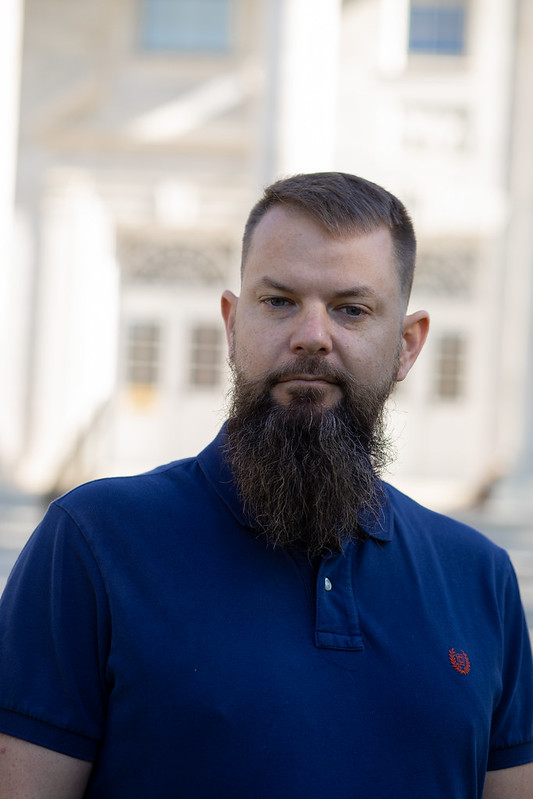
Did you look at any other schools? And if you did, or if you didn’t, why did Rowan stick out?
Honestly, Rowan it since it’s just right here. I didn’t look at any other schools. But I love Rowan. I honestly can’t imagine being anywhere else.
The only college experience I know is whatever you see on TV, where everyone is sitting in an auditorium, 300 students taking notes and all lectures.
And then I go to my orientation. And we’re sitting in a lecture hall, and I was like, “Oh man, I don’t know about this. Is this the way it’s always gonna be?” Like, no, most classes are 20, 25, maybe 30 students. That’s manageable. And you get that experience with your professor and you, and you get the help you need. You get the guidance you need. From the professors, I feel, in the smaller setting, to me, produces a better outcome.
What are your hopes for the future after you graduate?
Well, after I graduate, because [Rowan] started a master’s program in this field, so I’m definitely pursuing that. I tell you what, again, my first semester to now I would have never even thought about trying to go to graduate school, it just didn’t just didn’t gel with anything I’ve ever thought, so I want to do that.
There’s so many choices, Homeland Security and Border Patrol, they all have some kind of emergency management or disaster preparedness people, especially after and what we’re in today and you know, the whole pandemic the need for them increased dramatically. And I don’t think companies in general realized that it was something that they actually needed, so it kind of just falls on the shoulders of whoever doesn’t have the least amount of collateral duties at work, and I don’t mind being that guy.
Now if I can make the change somewhere I’ll do it. That’s the way the Marine Corps is. We challenge ourselves every day in the Marine Corps. You get challenged by somebody every day in the Marine Corps. Once I retired, I couldn’t imagine not being challenged anymore.
Now I have to challenge myself, and college was the way to do it right now. Because I can work, but this is a whole different level. Learn about new technology, new ways of doing things, researching. I want to make a difference. That’s what I want to do. So whatever I need to do to do that.
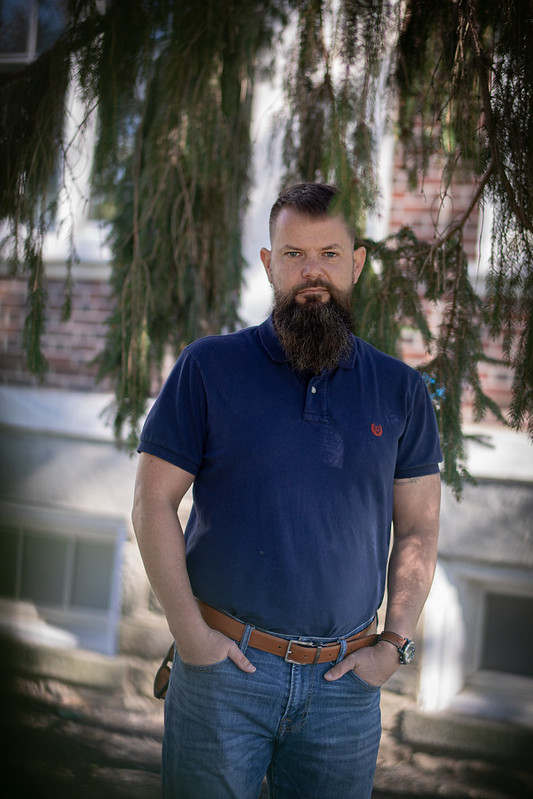
What would you say to people who were in your situation when in the military right out of high school, retired and that are on the fence about going to college? What would you say to them?
Easy. Take that step. Just take that step, you know.
I mean, if you were bold enough to go in the military, and you can handle that for 20 years, you can absolutely handle one semester of any school when anything, anybody throws at you, period. Why not? That’s the thing. Why wouldn’t you? Even though it’s definitely not for everybody, but that first semester, it’s nothing. It’s not any harder than anything you’ve ever done, ever. So now test it out. See if you like it; if you don’t, you didn’t hurt yourself. You only gained, you didn’t lose.
Watch Morgan’s story here:
Like what you see?
Select photos courtesy of:
Morgan Kelley

